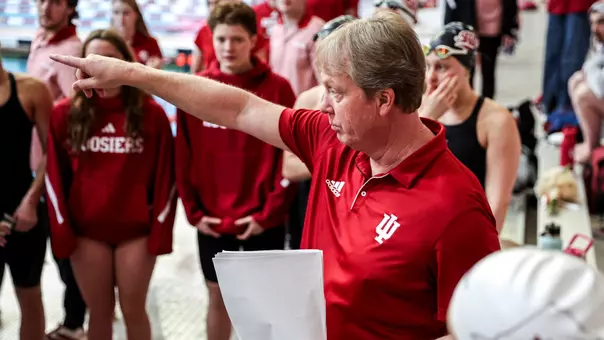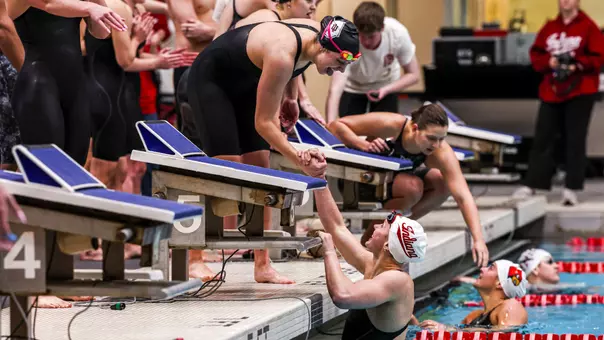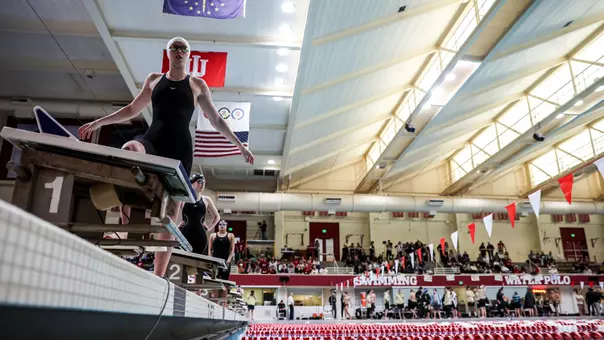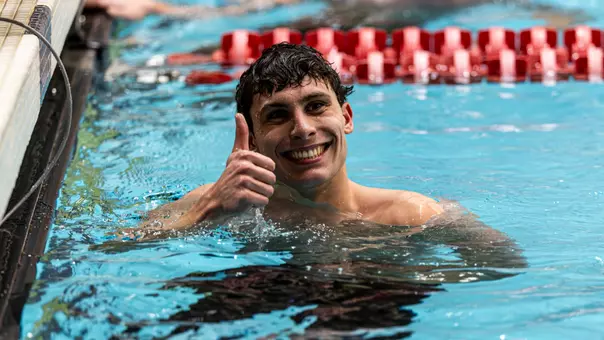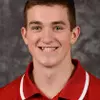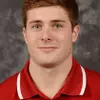Indiana University Athletics
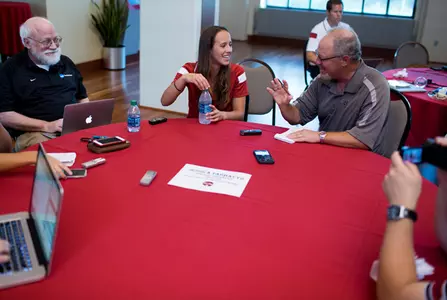
IU Swimming & Diving Media Day - Diving Selected Questions Transcript
7/11/2016 6:23:00 PM | Men's Swimming and Diving
IU Swimming & Diving Olympian Media Day
Divers Selected Questions - Transcript
Jessica Parratto (Team USA)
What was the first thing that you did after qualifying?
PARRATTO: "I cried. The synchronized diving was first, and that was the most emotional day for me. After the individual events, things had calmed down because that was a few days later. When I qualified in synchronized, that's when it actually became a realization. I told my mom the other day that I was walking up the stairs to do our last synchronized dive, I was getting super excited because we had hit our second-to-last dive pretty well and that was one of our key dives. Once we did that, I believed that we could do it. I don't really look at the scoreboard, but I had a feeling and I knew we had a lead going into our last dive. I didn't want to get ahead of myself, but when we were walking up the stairs I was getting a little excited, a little emotional. I walked out on the platform and saw my family in the crowd, and I was excited when I saw them even though I don't usually look into the crowd. Once we hit our last dive, it got to me all of a sudden. It was a really special moment.
Was it happiness or exhaustion that hit you first?
PARRATTO: I think I was feeling all of it. I felt so many emotions that I wasn't prepared for. You can't really expect anything because you don't know how you're going to feel until it happens. I felt the hard work paying off, all the sacrifice, the people who have been behind us, my family in the stands; it was all really special to me. But I still had a job to do in the individual competition, so it was a quick turnaround to that.
Diving synchronized versus diving individual at the Olympics: which will be tougher for you?
PARRATTO: I think the individual competition. In synchronized diving at the Olympic Games, there's just a final round. We kind of looked at it like our nationals last December was our preliminary round, and the World Cup was the semifinal round. We were the first event final at the World Cup, which was a lot of pressure. I kind of mentally prepared for that well before it actually happened. That event might have been more pressure than the Olympic trials, because we had to win that spot for our country. Once we secured that spot, it wasn't ours to take yet but we got it at the Olympic Trials. Now we're into the finals, which is crazy to think that we're already in an Olympic Final. I'm trying to process that in the moment, but it's really exciting.
Amy Cozad (Team USA)
What's unique about Drew's coaching style? Why is he so effective at producing Olympians, and why is he the right fit as the head coach of the United States?
COZAD: My first impression when I started diving with Drew was that he has a vision: This is the way a dive is supposed to be, and this action is the most efficient way to make you jump higher and spin faster. Some coaches try to make it personal to each athlete, and it gets confusing because you might not be doing it the best way. But Drew seems to have it figured out, and it's nice to have a coach that has the confidence in himself to know and teach the right way to do it.
Why did you decide to dive at IU?
COZAD: It was an exciting adventure. I was a good diver, and could do a lot of the difficult dives, but I was never one of the top contenders in the junior world. So I went on my recruiting trips and it seemed like, everywhere I went, they didn't have room on their team. My number one choice didn't have room on the team, and it was the same for a lot of my top choices. Now, I understand that process, but at the time I was crushed. Indiana called and said that they didn't know I was a senior, and a lot of divers had already made their commitments. Indiana asked for me to be on their team, and I said, "Absolutely, why not." Nobody else wants me and Indiana seemed like they really wanted me.
Did you know about the history of the Indiana Diving program before you joined?
COZAD: I didn't, and honestly I was never much to look back on the history of diving. But I knew when I came on the team that it was the biggest diving team in the nation at the time.
Had you even thought about going to IU when you were going through your college choices?
COZAD: No, because my whole family went to Purdue. At least ten people in my family went to school at Purdue, so I was thinking about Purdue. They said that their team was full, but I was still thinking about going to Purdue and not diving. I had never considered Indiana before they called me.
How does it feel now, knowing that you couldn't find a spot on these other teams and now you're going to the Olympics?
COZAD: It was meant to be. Nobody saw me as a potential Olympian, they just saw me as another kid who wasn't going to succeed at that level. But coach Huber told me, "You can do this if you want to, and I'll help you," and I was on board. That's just what I needed, for somebody to believe in me.
James Connor (Team Australia)
When did you start to believe that you could contend as an Olympian?
CONNOR: It was before London, around the 2011 World Championships. I think it was my age. I was 17 at London, and as far as I was concerned, my best years of diving would be from 21 to 24. I like to hide behind that, it was almost my way of relieving the pressure. I told myself that I was a young kid, way out of my league. At the 2012 trials I was incredibly nervous. I went to the pool and did a warm-up, and then went back to the hotel and got really nervous. Before I returned to the pool, I told myself, "The Olympics are reserved for the best of the best, and at 17 years old I'm not at that level." It would be incredible to go, but I was okay if it didn't happen because of the respect I have for the Olympics. This time, I don't have any more pressure but my expectations are higher. I don't that fallback option of hiding behind my age anymore. As far as I'm concerned, I'm going to go into Rio and put everything I have into six dives, and hopefully they'll be good enough to advance to the next six. If those go well and I get into the finals, we'll do as well as we can from there.
After preparing with coach Drew Johansen this time around, what makes him as good as he is and how much has he helped you prepare for the Olympics?
CONNOR: As far as coaching secrets go, you'll have to ask him because I'm not sure what all makes it work so well. I came here uncertain of my goals, whether I could dive in the Olympics again or not. But the turnaround was so quick. I'm a big believer in the fact that I compete and perform a lot better when I'm happy, and I train a lot better when I'm happy. When you're smiling, it's almost like you forget that you're working hard. I think that side of things, coming to America and training with Drew and my teammates, has made me happier as a person and that's definitely helped. As far as my relationship with coach is concerned, I've never connected with a coach like him, and I've never experienced a relationship like Drew has with diving. He's so innovative. He never stops thinking, never stops wondering how we can get better or what we can try, whether it's a new drill or the incorporation of technology. If he thinks it will work, and if it could help us, he'll do it. I grew up with people instructing me to "dive until you break down"—keep doing repetitions as often as you can to get better. I've never done better than I am doing with Drew's training system, and I'm really excited to go to Rio and hopefully perform well for myself, my family, and my country. But I also want to show the world that what we do here works. As far as I'm concerned, I'm representing IU as much as I'm representing Australia.
Michael Hixon
How relaxing is it to go to the Olympics with your head coach as the Olympic team's head coach?
HIXON: It's unbelievable. I'm so excited he's coming with us, and he's really getting what he deserves. He's one of the hardest working coaches in the country, and the fact that he gets to be the head coach of the Olympic team is truly deserved.
How has coach Johansen improved your craft?
HIXON: He's made me better in every single way. I went from being someone who didn't really practice very well and wasn't much of a competitor, and he's increased my level for practice. That in turn has made my level in competition better. I've gotten at least 50 points better since I've been here, and that's huge.
What is it like to be a part of Indiana's history with diving?
HIXON: It means so much. Hobie [Billingsley] comes by the pool sometimes and pulls you aside to tell you, "Back in the day we had someone win a medal in this event, and he won it out of nowhere." He has a lot of inspiring stories that make you believe in what you're doing.
Do you think your name will be on one of those banners?
HIXON: I hope so, for sure. My favorite thing about training here is the first time I walked into the indoor pool, you see these huge 20-feet banners of the great Olympians from Indiana: Cynthia Potter, Mark Spitz, Mark Lenzi, and so on. I call it the "Wall of Gods", because you walk in and all of the gods are there. Walking in there and seeing the history of who has come before you is so special, it's unbelievable.
Your mother is a coach. When you're diving, is she in your head?
HIXON: I don't have her in my head while I'm diving, but she coached me until I was 18 years old. She was unbelievable, a great coach and an awesome mom, and I definitely wouldn't be here without her. We talk after every event and she speaks with me after practice. She's awesome.
What are you most looking forward to?
HIXON: I think the fact that it's the grand stage—you get to have the best in the world all in one place. I've had that before, but this is the event that everybody aims for. This is the big one, and I'm excited to see what everyone has and see what I can put against it.
Divers Selected Questions - Transcript
Jessica Parratto (Team USA)
What was the first thing that you did after qualifying?
PARRATTO: "I cried. The synchronized diving was first, and that was the most emotional day for me. After the individual events, things had calmed down because that was a few days later. When I qualified in synchronized, that's when it actually became a realization. I told my mom the other day that I was walking up the stairs to do our last synchronized dive, I was getting super excited because we had hit our second-to-last dive pretty well and that was one of our key dives. Once we did that, I believed that we could do it. I don't really look at the scoreboard, but I had a feeling and I knew we had a lead going into our last dive. I didn't want to get ahead of myself, but when we were walking up the stairs I was getting a little excited, a little emotional. I walked out on the platform and saw my family in the crowd, and I was excited when I saw them even though I don't usually look into the crowd. Once we hit our last dive, it got to me all of a sudden. It was a really special moment.
Was it happiness or exhaustion that hit you first?
PARRATTO: I think I was feeling all of it. I felt so many emotions that I wasn't prepared for. You can't really expect anything because you don't know how you're going to feel until it happens. I felt the hard work paying off, all the sacrifice, the people who have been behind us, my family in the stands; it was all really special to me. But I still had a job to do in the individual competition, so it was a quick turnaround to that.
Diving synchronized versus diving individual at the Olympics: which will be tougher for you?
PARRATTO: I think the individual competition. In synchronized diving at the Olympic Games, there's just a final round. We kind of looked at it like our nationals last December was our preliminary round, and the World Cup was the semifinal round. We were the first event final at the World Cup, which was a lot of pressure. I kind of mentally prepared for that well before it actually happened. That event might have been more pressure than the Olympic trials, because we had to win that spot for our country. Once we secured that spot, it wasn't ours to take yet but we got it at the Olympic Trials. Now we're into the finals, which is crazy to think that we're already in an Olympic Final. I'm trying to process that in the moment, but it's really exciting.
Amy Cozad (Team USA)
What's unique about Drew's coaching style? Why is he so effective at producing Olympians, and why is he the right fit as the head coach of the United States?
COZAD: My first impression when I started diving with Drew was that he has a vision: This is the way a dive is supposed to be, and this action is the most efficient way to make you jump higher and spin faster. Some coaches try to make it personal to each athlete, and it gets confusing because you might not be doing it the best way. But Drew seems to have it figured out, and it's nice to have a coach that has the confidence in himself to know and teach the right way to do it.
Why did you decide to dive at IU?
COZAD: It was an exciting adventure. I was a good diver, and could do a lot of the difficult dives, but I was never one of the top contenders in the junior world. So I went on my recruiting trips and it seemed like, everywhere I went, they didn't have room on their team. My number one choice didn't have room on the team, and it was the same for a lot of my top choices. Now, I understand that process, but at the time I was crushed. Indiana called and said that they didn't know I was a senior, and a lot of divers had already made their commitments. Indiana asked for me to be on their team, and I said, "Absolutely, why not." Nobody else wants me and Indiana seemed like they really wanted me.
Did you know about the history of the Indiana Diving program before you joined?
COZAD: I didn't, and honestly I was never much to look back on the history of diving. But I knew when I came on the team that it was the biggest diving team in the nation at the time.
Had you even thought about going to IU when you were going through your college choices?
COZAD: No, because my whole family went to Purdue. At least ten people in my family went to school at Purdue, so I was thinking about Purdue. They said that their team was full, but I was still thinking about going to Purdue and not diving. I had never considered Indiana before they called me.
How does it feel now, knowing that you couldn't find a spot on these other teams and now you're going to the Olympics?
COZAD: It was meant to be. Nobody saw me as a potential Olympian, they just saw me as another kid who wasn't going to succeed at that level. But coach Huber told me, "You can do this if you want to, and I'll help you," and I was on board. That's just what I needed, for somebody to believe in me.
James Connor (Team Australia)
When did you start to believe that you could contend as an Olympian?
CONNOR: It was before London, around the 2011 World Championships. I think it was my age. I was 17 at London, and as far as I was concerned, my best years of diving would be from 21 to 24. I like to hide behind that, it was almost my way of relieving the pressure. I told myself that I was a young kid, way out of my league. At the 2012 trials I was incredibly nervous. I went to the pool and did a warm-up, and then went back to the hotel and got really nervous. Before I returned to the pool, I told myself, "The Olympics are reserved for the best of the best, and at 17 years old I'm not at that level." It would be incredible to go, but I was okay if it didn't happen because of the respect I have for the Olympics. This time, I don't have any more pressure but my expectations are higher. I don't that fallback option of hiding behind my age anymore. As far as I'm concerned, I'm going to go into Rio and put everything I have into six dives, and hopefully they'll be good enough to advance to the next six. If those go well and I get into the finals, we'll do as well as we can from there.
After preparing with coach Drew Johansen this time around, what makes him as good as he is and how much has he helped you prepare for the Olympics?
CONNOR: As far as coaching secrets go, you'll have to ask him because I'm not sure what all makes it work so well. I came here uncertain of my goals, whether I could dive in the Olympics again or not. But the turnaround was so quick. I'm a big believer in the fact that I compete and perform a lot better when I'm happy, and I train a lot better when I'm happy. When you're smiling, it's almost like you forget that you're working hard. I think that side of things, coming to America and training with Drew and my teammates, has made me happier as a person and that's definitely helped. As far as my relationship with coach is concerned, I've never connected with a coach like him, and I've never experienced a relationship like Drew has with diving. He's so innovative. He never stops thinking, never stops wondering how we can get better or what we can try, whether it's a new drill or the incorporation of technology. If he thinks it will work, and if it could help us, he'll do it. I grew up with people instructing me to "dive until you break down"—keep doing repetitions as often as you can to get better. I've never done better than I am doing with Drew's training system, and I'm really excited to go to Rio and hopefully perform well for myself, my family, and my country. But I also want to show the world that what we do here works. As far as I'm concerned, I'm representing IU as much as I'm representing Australia.
Michael Hixon
How relaxing is it to go to the Olympics with your head coach as the Olympic team's head coach?
HIXON: It's unbelievable. I'm so excited he's coming with us, and he's really getting what he deserves. He's one of the hardest working coaches in the country, and the fact that he gets to be the head coach of the Olympic team is truly deserved.
How has coach Johansen improved your craft?
HIXON: He's made me better in every single way. I went from being someone who didn't really practice very well and wasn't much of a competitor, and he's increased my level for practice. That in turn has made my level in competition better. I've gotten at least 50 points better since I've been here, and that's huge.
What is it like to be a part of Indiana's history with diving?
HIXON: It means so much. Hobie [Billingsley] comes by the pool sometimes and pulls you aside to tell you, "Back in the day we had someone win a medal in this event, and he won it out of nowhere." He has a lot of inspiring stories that make you believe in what you're doing.
Do you think your name will be on one of those banners?
HIXON: I hope so, for sure. My favorite thing about training here is the first time I walked into the indoor pool, you see these huge 20-feet banners of the great Olympians from Indiana: Cynthia Potter, Mark Spitz, Mark Lenzi, and so on. I call it the "Wall of Gods", because you walk in and all of the gods are there. Walking in there and seeing the history of who has come before you is so special, it's unbelievable.
Your mother is a coach. When you're diving, is she in your head?
HIXON: I don't have her in my head while I'm diving, but she coached me until I was 18 years old. She was unbelievable, a great coach and an awesome mom, and I definitely wouldn't be here without her. We talk after every event and she speaks with me after practice. She's awesome.
What are you most looking forward to?
HIXON: I think the fact that it's the grand stage—you get to have the best in the world all in one place. I've had that before, but this is the event that everybody aims for. This is the big one, and I'm excited to see what everyone has and see what I can put against it.
Players Mentioned
IUBB Pregame Press Conference
Thursday, February 19
IUBB Postgame Press Conference
Sunday, February 15
IUWBB Postgame at USC
Friday, February 13
Darian DeVries Postgame Press Conference
Tuesday, February 10

